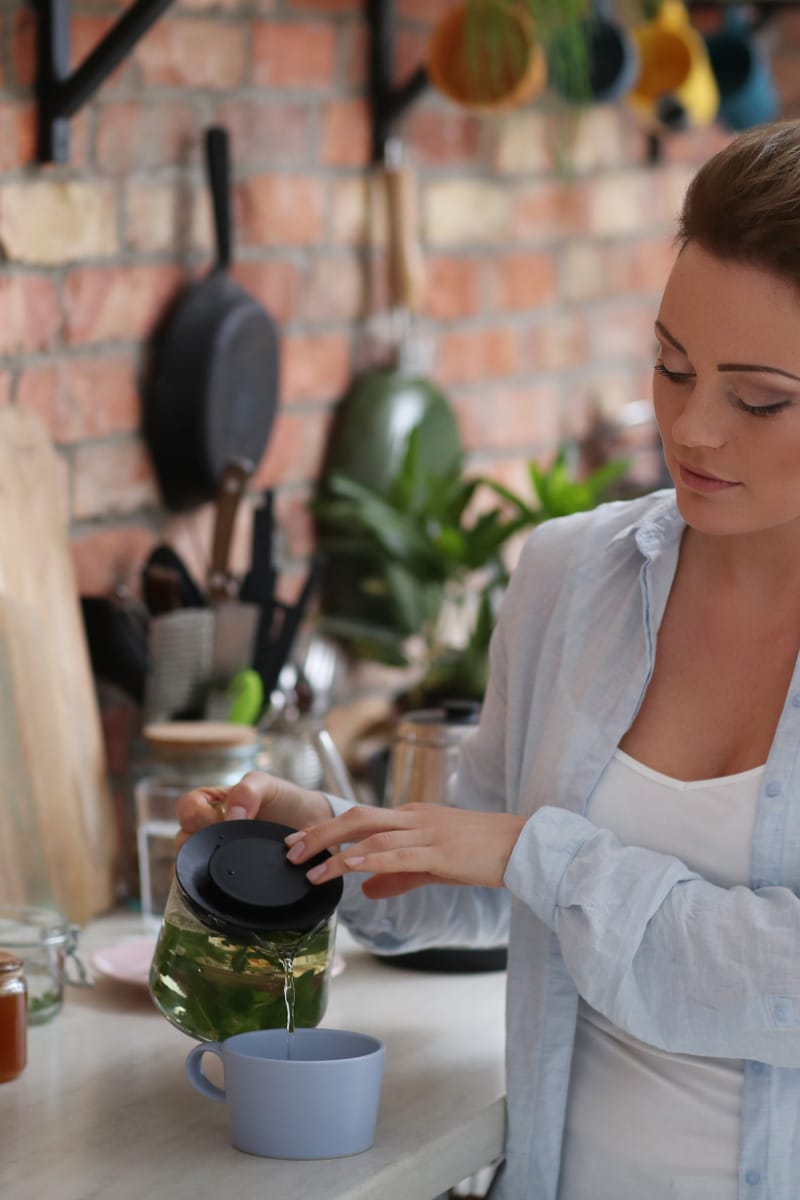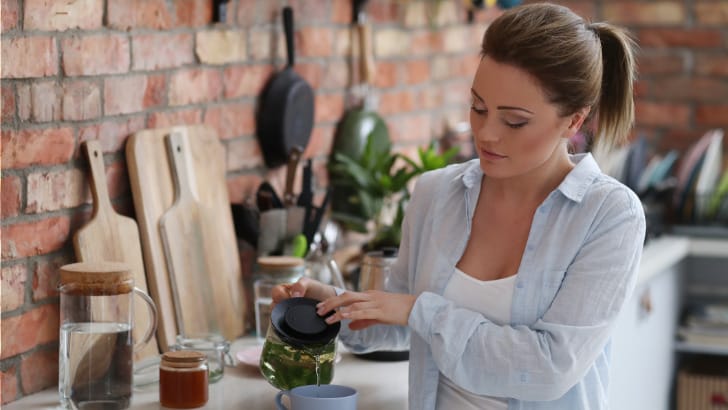Updated on May 1st, 2024
Ever thought about how much waste that gets generated in the kitchen? To start, there’s the tossed plastic wrap, packaging, broken food container lids. And then, there’s the daily use of ingredients that aren’t sustainable like beef and dairy.
Fortunately, you can take steps to lessen the personal environmental impact of your kitchen. Shifting towards eco-friendly kitchen products and services is an easy first step. That’s the subject I will cover today.
And here’s the best news: Many sustainable kitchen habits end up being more affordable and healthier. So, if you need a kick in the pants to consider the planet when you cook, think about the money you can save and the years you can add to your lifespan.

Read on for the scoop on seven easy but impactful eco-friendly substitutes for common kitchen necessities. Then, feel good about doing your part. Even small steps contribute to a healthier, more sustainable future.
1. Sustainable food storage
Plastic food containers pollute the environment and can leak harmful chemicals into our foods. Safer, better alternatives include glass or stainless-steel containers. The better option for you will depend on how you will use them.
Glass is easy to clean and microwavable. Stainless steel is durable and heat resistant. The downside is that you can’t put a stainless-steel container in the microwave.
You can also swap out plastic wrap and aluminum foil for beeswax wraps. Beeswax wraps are coated cotton sheets that are washable, reusable, and compostable. They work well for storing food because they are also breathable and antimicrobial — qualities that help keep food fresher, longer.
2. Eco-friendly salts and spices
You can also make an ecological difference while you’re spicing your food. Truly. Several brands now offer organic, ethically sourced salts and spices packed in biodegradable or reusable containers. Cinnamon Tree Organics sources from pesticide-free, small-scale growers, for example. Another option is Diaspora, which only sells fresh, single-sourced, organic spices.
These brands are better for the planet and taste great, too.
If you don’t have a good selection of eco-friendly spices in your local supermarket, there is another option. You can subscribe to meal plan programs like Green Chef that do the sourcing for you. You get delicious recipes plus high-quality, sustainably sourced ingredients delivered to you.
3. Kitchen tools that last
Sustainability is about investing in quality kitchen tools that can withstand the test of time. I harp on this topic with respect to clothes over at thebudgetfashionista.com: Spending more on quality often is usually less expensive than buying cheap items that don’t last.
Here are some eco-friendly trade-ins to consider:
- Replace plastic cutting boards with bamboo or wood. These materials are biodegradable and gentler on your knife edges.
- Replace synthetic plastic sponges with natural loofah or coconut fiber alternatives.
- Instead of non-stick pans, opt for cast iron skillets or stainless-steel pots. These will last you a lifetime if you care for them properly.
These swaps help you say goodbye to disposable culture and hello to quality in your kitchen.
4. Natural cleaning solutions
We need to clean for our own health and safety. But that shouldn’t come at the expense of plant and animal life. Sadly, too many cleaning products contain harsh and harmful chemicals that find their way into nature and wreak havoc.
You can stop contributing to that cycle by choosing safer DIY cleaning solutions, including those in our substitutes for dishwasher detergent post.
Vinegar, baking soda, and essential oils create a potent — and natural — cleaning solution for your countertops and appliances.
Alternatively, there are plenty of green brands that offer biodegradable and non-toxic cleaners. Choose these to make sure what’s going down your drains isn’t destroying ecosystems in lakes, rivers, and oceans. You can have a cleaner kitchen without poisoning the planet.
5. Greener coffee and tea options
It’s likely you have the opportunity to make your coffee or tea routine more eco-friendly. You could, for example:
- Buy organic, fair-trade products. These brands promote ethical practices and taste amazing, too.
- Change brewing methods. Ditch the disposable pods for a French press or a reusable pour-over coffee maker.
- Opt for refillable pods or compostable pods if you aren’t ready to give up your single-serving machine.
These small changes can make that morning cuppa even more enjoyable. After all, every sip counts!
6. Eco-friendly baking essentials
Bakers, rejoice! You need only make small changes to add some extra feel-good vibes to your baking routine:
- Opt for reusable, silicone baking mats that eliminate the need for disposable parchment paper.
- Use metal or glass baking forms instead of single-use aluminum pans.
- Buy wooden or bamboo utensils rather than plastic ones. Wood and bamboo are biodegradable and naturally antimicrobial.
Bake your favorite creations without guilt by implementing these changes. Now you can enjoy your homemade treats with an added sweet hint of eco-consciousness.
7. Composting in the kitchen
Composting is an easy thing to learn and it’s an effective means of reducing your kitchen waste.
Composting essentially means turning organic waste (like fruit peels, coffee grounds, and eggshells) into a nutrient-rich soil conditioner. You can use your compost for houseplants and garden plants. Or, donate it to anyone who gardens — a friend, a gardening group, even a local farm will probably take your compost.
You don’t need extra space to compost either. Try a countertop compost bin to stage a green revolution from your kitchen without causing any smell or attracting pests. Go ahead, let your food scraps serve a higher purpose.
To greener kitchens and beyond!
Truly, it doesn’t take much to make sustainable choices in the kitchen. Swap out your plastics and single-use tools for reusable products make from sustainable materials, ditch expensive and chemical-laden cleaners, and pop your food waste into a bin.
Long-term, these changes will save you money. You’ll also feel good that your eco-friendly choices are making the world better, one day at a time.
